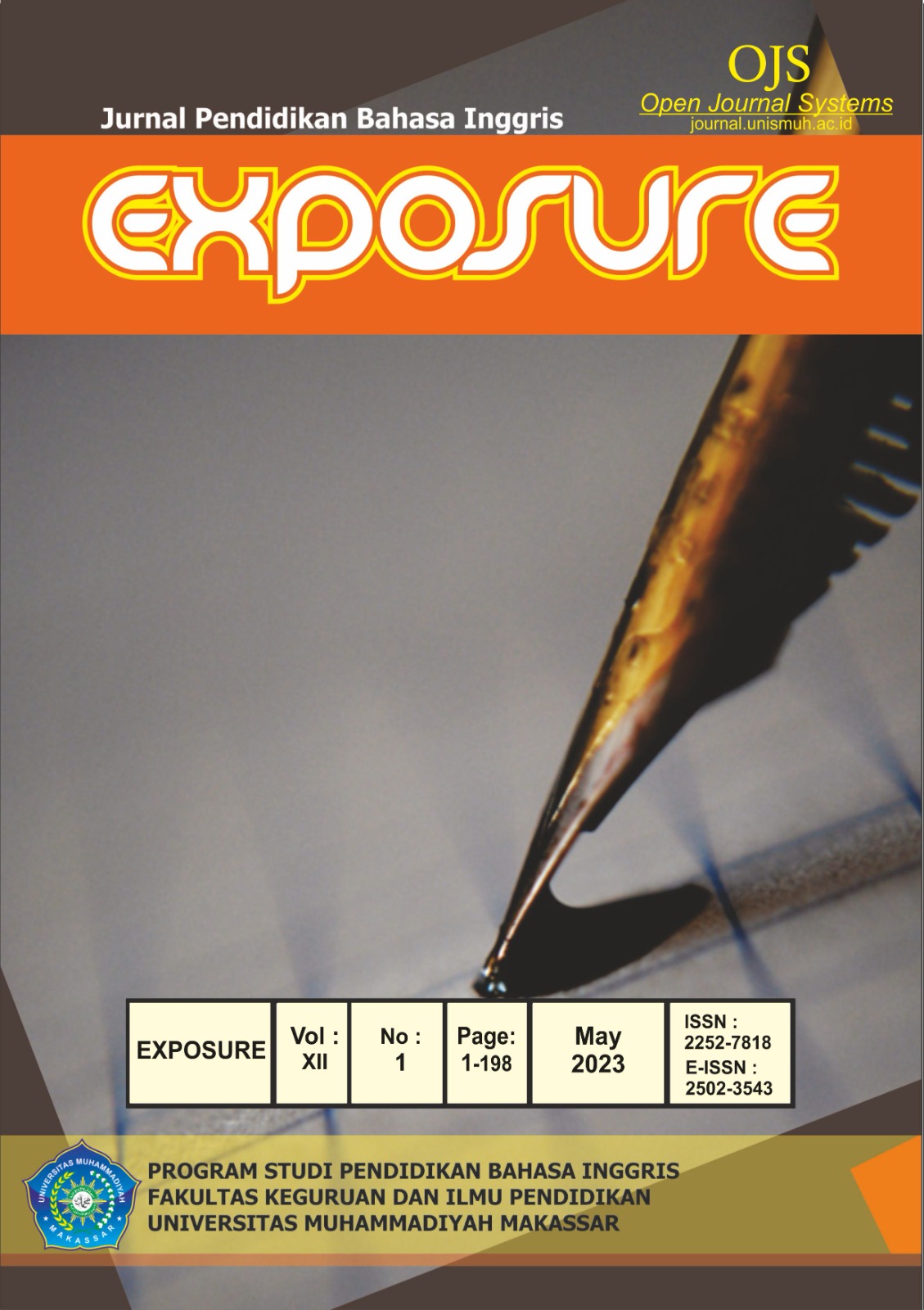TEACHING VOCABULARY BY USING PLAYDOUGH FOR SPECIAL NEED STUDENTS
DOI:
https://doi.org/10.26618/exposure.v12i1.10456Abstract
This research aims to develop a playdough game as a medium for learning English Vocabulary. This research used Classroom Action Research with qualitative methods. This research was carried out in a special school in Banjarmasin, South Kalimantan. The purpose of this research is to facilitate the learning process in the classroom for students with special needs. Playdough media can help students remember vocabulary more easily and train fine motor skills in students, and not only that, playdough can also overcome tantrums and increase students’ focus on learning. Therefore, learning by using playdough can make it easier for students to remember vocabulary, increase focus on learning, and can overcome tantrums in students when studying in class.
References
Aziza, A. N., & Samawi, A. (2015). Pengaruh Media Playdough terhadap Keterampilan Menulis Permulaan Siswa Tunagrahita. Jurnal Penelitian dan Pengembangan Pendidikan Luar Biasa, 2(1), 57 – 63.
Handayani, P. H., Gandamana, A., & Farihah, F. (2017). Pengembangan Kreativitas Anak Usia Dini dalam Keluarga. Jurnal Keluarga Sehat Sejahtera, 15(2), 46 – 56.
Lersilp, S., Putthinoi, S., & Lersilp, T. (2018). Facilitators dam Barriers of Assistive Technology and Learning Environment for Children with Special Needs. Occupational Therapy International, 2018. https://doi.org/10.1155/2018/3705946
Pradipta, R. F., & Dewantoro, D. A. (2019). Origami dan Fine Motoric Ability of Intellectual Disability Students. International Journal of Innovation, 5(5), 531-545.
Setiawan, D. Sukarjo, S., & Melatisarim P. (2021). Playdough Guidebook to Improve the Grade III Student’s Creativity. In 2nd Annual Conference on Education and Social Sciences (ACCESS 2020) (pp. 84 – 89). Atlantis Press.
Stephen M. Corey (1954) Action Research in Education, The Journal of Educational Research, 47:5, 375-380, DOI: 10.1080/00220671.1954.10882121
Sudiasih, N. W. Y., Made Sulastri, M. P., Sudatha, I. G. W., & ST, M. P. (2014). Penerapan Metode Pemberian Tugas Berbantuan Media Playdough untuk Meningkatkan Kemampuan Motorik Halus. Jurnal Pendidikan Anak Usia Dini Undiksha, 2(1).
Sujatwanto, K. (2020). Peningkatan Kemampuan Mengenal Lambang Bilangan 0 – 10 Melalui Media Playdough pada Siswa Autis di SLB Negeri 1 Bantul. Exponential (Education for Exceptional Children) Jurnal Pendidikan Luar Biasa. 1(1), 13 – 19.
Tomal, Daniel R. (2010). Action Research for Educators. America: United States.
Downloads
Published
Issue
Section
License
Authors who publish with this journal agree to the following terms:
In order to assure the highest standards for published articles, a peer review policy is applied. In pursue of the compliance with academic standards, all parties involved in the publishing process (the authors, the editors and the editorial board and the reviewers) agree to meet the responsibilities stated below in accordance to the Journal publication ethics and malpractice statement.
Duties of Authors:
- The author(s) warrant that the submitted article is an original work, which has not been previously published, and that they have obtained an agreement from any co-author(s) prior to the manuscript’s submission;
- The author(s) should not submit articles describing essentially the same research to more than one journal;
- The authors(s) make certain that the manuscript meets the terms of the Manuscript Submission Guideline regarding appropriate academic citation and that no copyright infringement occurs;
- The authors(s) should inform the editors about any conflict of interests and report any errors they subsequently, discover in their manuscript.
Duties of Editors and the Editorial Board:
- The editors, together with the editorial board, are responsible for deciding upon the publication or rejection of the submitted manuscripts based only on their originality, significance, and relevance to the domains of the journal;
- The editors evaluate the manuscripts compliance with academic criteria, the domains of the journal and the guidelines;
- The editors must at all times respect the confidentiality of any information pertaining to the submitted manuscripts;
- The editors assign the review of each manuscript to two reviewers chosen according to their domains of expertise. The editors must take into account any conflict of interest reported by the authors and the reviewers.
- The editors must ensure that the comments and recommendations of the reviewers are sent to the author(s) in due time and that the manuscripts are returned to the editors, who take the final decision to publish them or not.
Authors are permitted and encouraged to post online a pre-publication manuscript (but not the Publisher’s final formatted PDF version of the Work) in institutional repositories or on their Websites prior to and during the submission process, as it can lead to productive exchanges, as well as earlier and greater citation of published work (see The Effect of Open Access). Any such posting made before acceptance and publication of the Work shall be updated upon publication to include a reference to the Publisher-assigned DOI (Digital Object Identifier) and a link to the online abstract for the final published Work in the Journal.

